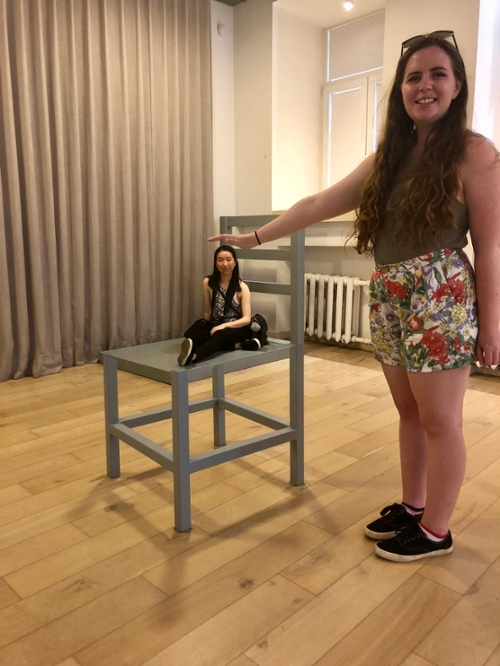KGB & GDPR
This weekend, Ariana and I visited the Museum of Genocide Victims, which is located in a former KGB prison a few blocks from our apartment. While I knew about the occupation of Lithuania from the Soviet Revolution class I took in college, neither Ariana or I were prepared for the intense level of brutality and suffering captured in the exhibits. There were rooms detailing everything from the history of the national resistance against the Soviets, and the mass deportations of the Lithuanians, to the experiences of those sent to prison and labor camps.
We walked through the prison cells and the execution chamber, all of which were preserved exactly as way they were when the KGB left Lithuania. When we entered the yard of the prison we were greeted by the ominous sound of a hammer hitting metal, I thought it was a very effective and chilling sound effect, but we found out it was just the construction happening next door. We learned a lot because most of the exhibits were translated, one of the most shocking was a cell with a sunken floor and a pedestal in the center. The sign explained that this cell would be filled with ice cold water, and prisoners would be forced to stand on the pedestal until they collapsed into the water from exhaustion. This was a truly sobering experience especially when we realized that this prison was operational until Lithuanian Independence in 1991. Our time in the museum connected us to this very long, bleak period in the history of Lithuania.

For some much needed cheering up, Ariana and I had lunch at Open Kitchen, a large outdoor dining area with tons of stands and food trucks. To celebrate Memorial Day, we got hotdogs. The menu wasn't’t translated so we picked blindly but we were very happy with the results. Then we spent the afternoon at the Museum of Illusions and had a total blast. We finished off our Saturday by visiting the famous/infamous Trump and Putin mural.


We spent most of our time this week designing a comprehensive guide for practitioners, detailing the newly launched General Data Protection Regulation, and how its enforcement will affect the VILIAS NarcoMap project. NarcoMap is an ongoing, EU funded study of opioid trafficking. The substantive data will be collected in interviews, primarily with members of law enforcement, from the four partnering countries. Because the GDPR sets new standards for informed consent when collecting personal data, Algis assigned us the task of interpreting and explaining the new requirements in terms that can be easily comprehended by the criminologists, psychologists and others working on this project. This was our first experience with statutory interpretation and while the rules were relatively easy to understand the hardest part was summarizing them for non-lawyers and hypothesizing how some of the vague terminology will be interpreted and applied. I began by deciphering Article 13 and 14. which present the information requirements that must be met when collecting personal data, and considered what our organization will need to do to comply.
We also created an overview of the ethical standards for data collection in the US. We drew on our knowledge of Constitutional Law and discussed the "penumbra" of a right to privacy that can be found within the Bill of Rights. We also examined the Fair Trade Commission's Fair Information Practice Principles, which standardized the ethical principles regarding data collected in the electronic marketplace and, The Belmont report, which focused on biomedical and behavioral research standards. I think our favorite part of this project was knowingly chuckled with each other every time a website asked us to update our privacy agreements this week.
The final task we worked on was for the VICToRIIA project, which is an effort between Lithuania, Italy, Portugal and Romania to increase the effectiveness of victim support by focusing on the current best practices. We are gathering data on each country's methods relating to the referral of victims to the relevant support organizations, individual assessments of victims' needs, and information provision. We complied a summary of the proposal and wrote a letter with 5 general, probing questions that will be sent to the partner states to collect information about their current victim support practices.

The best thing we ate this week was definitely at La Casa de Jose! Our landlord works at this restaurant and before we sat down she and the owner, Jose, had chosen what taps we would be eating and what wine would accompany them. It's great that our apartment was nearby because by the end of the meal we were so full of delicious seafood and bread we could hardly move. We spent two hours talking with Jose and about his time in Spain and his experience in Lithuania. We told him we were having trouble making friends and he flatly told us that was because Lithuanians are rude. This was very different that Algis’s reaction, he was shocked that his advice to go stand at a bar and wait for people to talk to us had not been successful, he firmly believes that in his day, any number of Lithuanians would be eager to get to know us. He is also consistently shocked by how quickly we work and is often telling us we have done more than he needed and should stop working so hard. That might be the biggest culture shock we have experienced so far, on Thursday when Algis asked us when we could complete our VICToRIIA assignment, and I replied that we could send it to him Monday he nearly fell out of his chair. Ariana and I have not adjusted to this European summer work ethic but we will keep exploring and continue our quest for friends!
